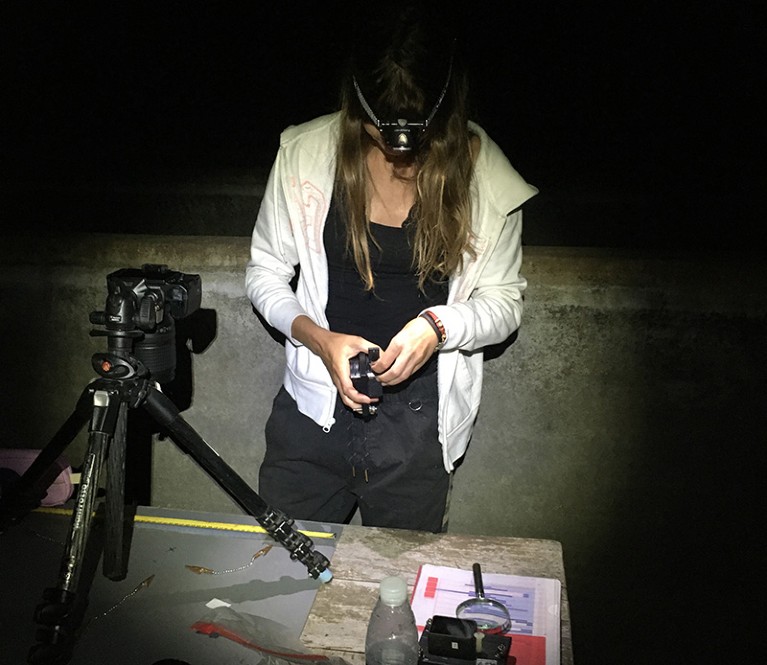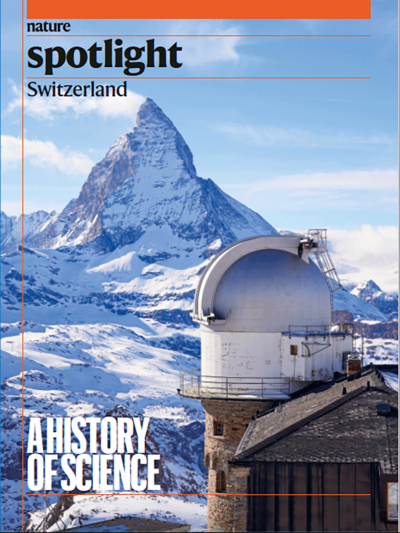[ad_1]

Carolin Sommer-Trembo at Lake Tanganyika.Credit: Simon Hornung
Carolin Sommer-Trembo’s first foray into studying fish behaviour was during her PhD at the University of Frankfurt in Germany, which she completed in 2017. The following year, she moved to Basel, Switzerland, to launch a postdoctoral project that focused on the cichlid fishes of Lake Tanganyika in Africa, the world’s longest freshwater lake. Now, she’s continuing this work as a postdoc at the University of Zurich in Switzerland. Sommer-Trembo spoke to Nature about her research, her science-outreach efforts and why she wants to continue her career in Switzerland.
What do you study?
My research focuses on how animal behaviour can affect evolutionary processes. Specifically, I focus on adaptive radiation — the way in which many species rapidly evolve from a common ancestor. This process is a huge contributor to biodiversity. As a postdoc, I’ve studied how behaviour might have contributed to the adaptive radiation of cichlid fishes in Lake Tanganyika.
How many cichlid species exist?
There are about 240 species of cichlid fishes, all in Lake Tanganyika, that evolved from one ancestor, and they aren’t found anywhere else in the world. The lake is more than 600 kilometres long and 1,400 metres deep. All these cichlid fish species can coexist because they are each adapted to their own ecological niche and feed on different food items. The first time I visited the lake was in August 2018, when I started my first postdoc at the University of Basel. I subsequently went back to do fieldwork.
What fish behaviours do you study?
For my first postdoc, I studied curiosity, by looking at exploratory behaviour. My hypothesis was that, for a new species to arise, a fish has to be curious enough to disperse to a new location and explore a different food resource. I found an important gene that drives differences in cichlid curiosity, which might have contributed to the adaptive-radiation event that occurred. Now, as a postdoc at the University of Zurich, I’m exploring how domestication affects evolution in cichlids. Specifically, I’m doing an experiment to see how selecting for fish that are less fearful of unknown objects and human handling affects the animals’ brain anatomy. Brain anatomy differences are some of the most common traits associated with domestication in mammals and chickens, but scientists don’t know whether it occurs across vertebrate species.
How did you get started in science outreach?
When I was PhD student in Frankfurt, I had a chance to explain my research programme to children at an event organized by the university. It was a great experience that inspired me to continue engaging in outreach. I started a blog about my fieldwork in Africa and, in 2022, I participated in a Swiss programme called FameLab, in which you explain your research to judges and a broad audience in just 3 minutes. Even though it takes time away from my research, I feel it’s worth it. The main problem is that you often don’t get credit or funding for it, so you have to do it in your free time.
Nature Spotlight: Switzerland
What makes Switzerland a good place to do science?
Science is a big priority in Switzerland; I feel I’m doing something meaningful when I talk to my peers and the public. That value is also expressed in the financial situation. For my project with cichlids, my team and I were able to buy diving equipment and 16 action cameras, for example. It was also expensive for me to do fieldwork in Africa, so having a large budget is liberating. During my PhD, I taught bachelor’s and master’s students to finance myself and worked as a dance instructor in the evenings. I’m grateful I had that experience, but I’m also grateful to have more financial freedom. You don’t have to stop your scientific thinking to ask whether you can afford a camera or not.
Is academia competitive in Switzerland?
The competition for senior positions is insane worldwide, but especially in countries such as Switzerland, where the conditions are attractive. I think a lot of the competition is driven by researchers from other countries who want to come here, including me. That being said, my laboratory environment isn’t competitive. I’m friends with my lab mates and we go out at the weekend. I’ve always tried to choose bosses who don’t enforce competition in the research group, because that negatively affects my mental health.
Why do you want to stay in Switzerland?
The conditions for doing science here are nice, but that’s just one factor. I did my bachelor’s, master’s and PhD at different universities; I’m tired of changing locations. I still live in Basel, even though my current position is at the University of Zurich. I have friends here and I love the city, so I’d really like to stay.
This interview has been edited for length and clarity.
This article is part of Nature Spotlight: Switzerland, an editorially independent supplement. Advertisers have no influence over the content.
[ad_2]
Source Article Link


